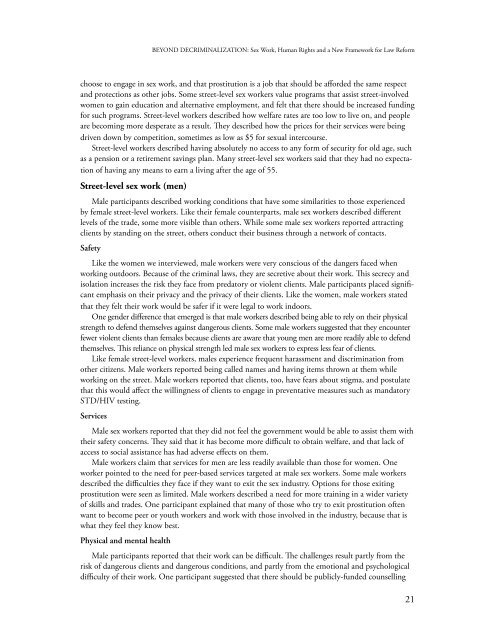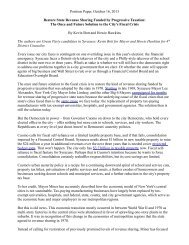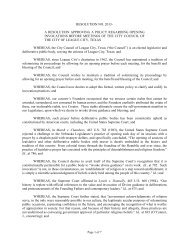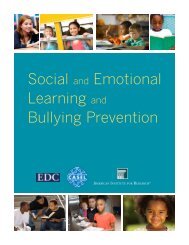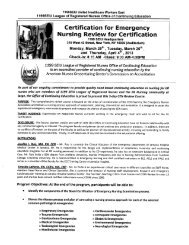Beyond Decriminalization: Sex-work, Human Rights and a New ...
Beyond Decriminalization: Sex-work, Human Rights and a New ...
Beyond Decriminalization: Sex-work, Human Rights and a New ...
- No tags were found...
Create successful ePaper yourself
Turn your PDF publications into a flip-book with our unique Google optimized e-Paper software.
BEYOND DECRIMINALIZATION: <strong>Sex</strong> Work, <strong>Human</strong> <strong>Rights</strong> <strong>and</strong> a <strong>New</strong> Frame<strong>work</strong> for Law Reformchoose to engage in sex <strong>work</strong>, <strong>and</strong> that prostitution is a job that should be afforded the same respect<strong>and</strong> protections as other jobs. Some street-level sex <strong>work</strong>ers value programs that assist street-involvedwomen to gain education <strong>and</strong> alternative employment, <strong>and</strong> felt that there should be increased fundingfor such programs. Street-level <strong>work</strong>ers described how welfare rates are too low to live on, <strong>and</strong> peopleare becoming more desperate as a result. They described how the prices for their services were beingdriven down by competition, sometimes as low as $5 for sexual intercourse.Street-level <strong>work</strong>ers described having absolutely no access to any form of security for old age, suchas a pension or a retirement savings plan. Many street-level sex <strong>work</strong>ers said that they had no expectationof having any means to earn a living after the age of 55.Street-level sex <strong>work</strong> (men)Male participants described <strong>work</strong>ing conditions that have some similarities to those experiencedby female street-level <strong>work</strong>ers. Like their female counterparts, male sex <strong>work</strong>ers described differentlevels of the trade, some more visible than others. While some male sex <strong>work</strong>ers reported attractingclients by st<strong>and</strong>ing on the street, others conduct their business through a net<strong>work</strong> of contacts.SafetyLike the women we interviewed, male <strong>work</strong>ers were very conscious of the dangers faced when<strong>work</strong>ing outdoors. Because of the criminal laws, they are secretive about their <strong>work</strong>. This secrecy <strong>and</strong>isolation increases the risk they face from predatory or violent clients. Male participants placed significantemphasis on their privacy <strong>and</strong> the privacy of their clients. Like the women, male <strong>work</strong>ers statedthat they felt their <strong>work</strong> would be safer if it were legal to <strong>work</strong> indoors.One gender difference that emerged is that male <strong>work</strong>ers described being able to rely on their physicalstrength to defend themselves against dangerous clients. Some male <strong>work</strong>ers suggested that they encounterfewer violent clients than females because clients are aware that young men are more readily able to defendthemselves. This reliance on physical strength led male sex <strong>work</strong>ers to express less fear of clients.Like female street-level <strong>work</strong>ers, males experience frequent harassment <strong>and</strong> discrimination fromother citizens. Male <strong>work</strong>ers reported being called names <strong>and</strong> having items thrown at them while<strong>work</strong>ing on the street. Male <strong>work</strong>ers reported that clients, too, have fears about stigma, <strong>and</strong> postulatethat this would affect the willingness of clients to engage in preventative measures such as m<strong>and</strong>atorySTD/HIV testing.ServicesMale sex <strong>work</strong>ers reported that they did not feel the government would be able to assist them withtheir safety concerns. They said that it has become more difficult to obtain welfare, <strong>and</strong> that lack ofaccess to social assistance has had adverse effects on them.Male <strong>work</strong>ers claim that services for men are less readily available than those for women. One<strong>work</strong>er pointed to the need for peer-based services targeted at male sex <strong>work</strong>ers. Some male <strong>work</strong>ersdescribed the difficulties they face if they want to exit the sex industry. Options for those exitingprostitution were seen as limited. Male <strong>work</strong>ers described a need for more training in a wider varietyof skills <strong>and</strong> trades. One participant explained that many of those who try to exit prostitution oftenwant to become peer or youth <strong>work</strong>ers <strong>and</strong> <strong>work</strong> with those involved in the industry, because that iswhat they feel they know best.Physical <strong>and</strong> mental healthMale participants reported that their <strong>work</strong> can be difficult. The challenges result partly from therisk of dangerous clients <strong>and</strong> dangerous conditions, <strong>and</strong> partly from the emotional <strong>and</strong> psychologicaldifficulty of their <strong>work</strong>. One participant suggested that there should be publicly-funded counselling21


